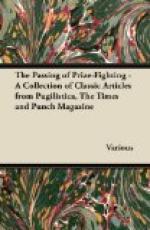DICKENS, son of “The Only One,” the Master.
Interesting? Of course it is, anything about
DICKENS, specially in connection with the immortal
Pickwick, must be interesting, and for chatty,
gossiping bookmaking we only say, “Give us Fitz.”
He is to the manor born. He is neither romancer
nor poet: “
poeta nascitur non ‘Fitz.’”
Occasionally FITZ is aggravatingly reticent.
For instance, at page 16 we read, “
Two or
three years ago”—which? two or
three?—“
a curious and amusing coincidence
brought the author’s son, a barrister in good
practice”—Which son? His
name? There were more sons than one: were
they all barristers? And was this one the only
one in good practice?—“
into connection
with his father’s famous book. It occurred
at a trial on the Circuit.” Which Circuit?
Which is “
the Circuit”? The
Baron, who is now the Last of the Barons but one,
only asks because the phrase “on Circuit”
would not have required his query; but “on the
Circuit” is another pair of shoes. “
A
trial.” What trial? When?
At p. 17, “
The Judge entered into the humour
of the thing”—what Judge?
The Baron is of opinion that in the well-known advertisement
about the Waverley Pen, quoted in a note at p. 25,
the correct order should be, “
The Pickwick,
the Owl, and the Waverley Pen”—not
Pickwick last. Did CHARLES DICKENS ever write
to FORSTER that he was “
getting on like a
house o’ fire"? Surely this should be a “house
a-fire,” or “a house on fire”; for
a “house o’ fire” means a “house
of fire,” which is not what the expression is
intended to convey. At p. 51, in a note, FITZ
says, “‘
Phiz, Whizz,’ or something
of that kind, was T. HOOD’s
joke.”
Was it? If so, where does the joke come in?
[Illustration]
My friend, the late GEORGE ROSE, better known as “ARTHUR
SKETCHLEY,” used to say that DICKENS took Sam
Weller from (as I understood him) a character
in one of O’KEEFE’s comedies. This
statement was given on the authority of Mr. BAYLE
BERNARD. But I am bound to say I can find nothing
like Sam in O’KEEFE’s; but I have
found DICKENS there bodily. It is in Sc. 1, Act
I. of Life’s Vagaries; or, The Neglected
Son. “‘Oh!’ exclaims FANNY, ‘if
my papa was to see me—oh!’ (Seeing
DICKENS, runs; he stops her.)” And, oddly
enough, in this edition of 1798, frequently as the
above-mentioned character appears, it is “on
this occasion only” that the name is spelt with
an “E.”
Mr. FITZGERALD, at p. 136 of this book, says, that
an actor named SAM VALE, appearing as Simon Splatterdash,
in a piece called The Boarding-House, was in
the habit of “interlarding his conversation
with metaphorical illustrations”—and
then follow the examples. The Boarding-House,
however, is not by O’KEEFE, but, as appears from
a note in Sketches by Boz, was being performed
when DICKENS’s short tale of The Boarding-House




